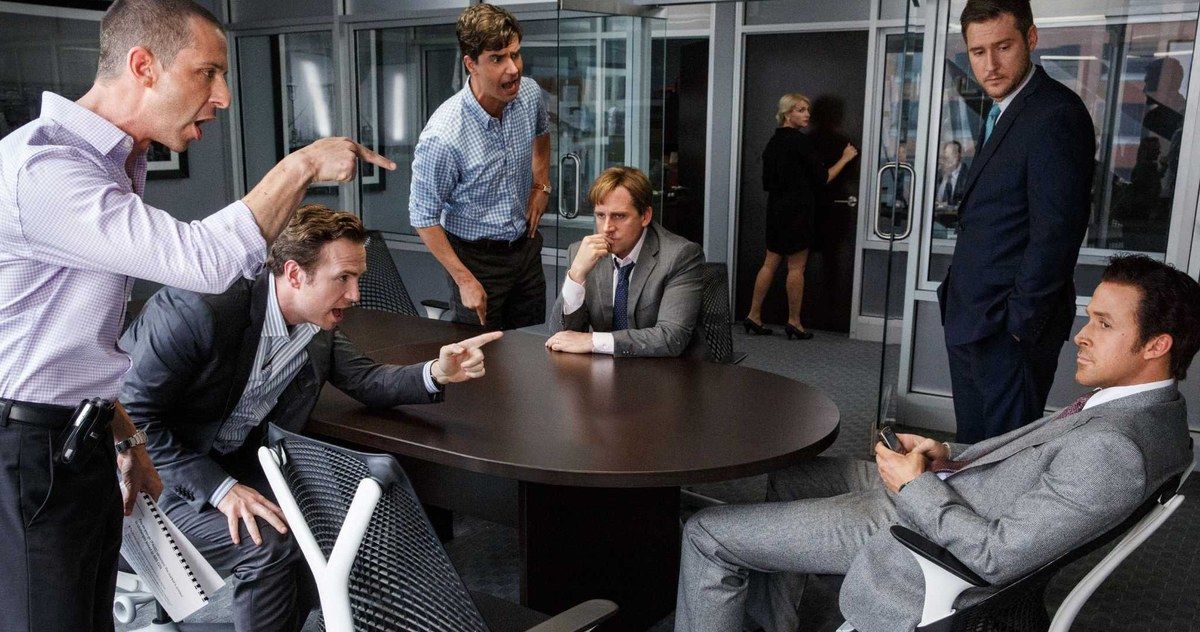Writer/director Adam McKay revisit's the economic collapse of 2008 in The Big Short. Based on the book by Michael Lewis, The Big Short is the true story of the men who foresaw the failure of the housing market. Then bet against the performance of mortgage bonds. A sweeping indictment of the greed, fraud, cronyism, and ineptitude of the banking system; The Big Short is a layman's guide to understanding how sub-prime mortgage lending led to a devastating global recession. McKay, known for his goofball comedies with Will Ferrell, takes a satirical edge here with characters breaking the fourth wall, and cuts of celebrity cameos explaining complex financial terms. It gets preachy, but is effective in educating and damning at once.
Ryan Gosling narrates the story as Jarred Vennett, a Deutsche Bank trader with a cutthroat persona and morally ambiguous lust for money. He introduces the audience to Michael Burry (Christian Bale), a former doctor turned brilliant hedge fund manager. Burry began looking into the thousands of loans that made up mortgage bonds in the early 2000s. He uncovered that underneath the façade of a safe investment, most mortgage bonds where rife with risky sub-prime, adjustable rate loans. Burry approached Wall Street banks to create a specific financial security, credit default notes, to bet against the housing market. While others deemed his actions utterly foolish, Vennett smelled that something was indeed rotten. And that there may be a fortune to be made when the house of cards inevitably crumbled.
The Big Short succeeds in painting Wall Street and the mega banks that run it as despicable villains. The ensemble characters have a moral center. But they are in it for the money, pure and simple. They quickly realize that the system is corrupt, but as explained in a pejorative monologue by Brad Pitt's character - Ben Rickert; they are betting on failure. That failure will lead to the destruction of countless lives. This fact is hammered in constantly as we see the avarice and greed of the duplicitous bankers reveling in the spoils of ill-gotten gains.
McKay spends time on the uniqueness of his characters, but his focus is solidly on education. An entire film could be made on Jarred Vennett's oily pessimism, or Michael Burry's savant behavior, but they are purely instrumental. McKay states early on that the banking industry hides behind terminology and confusion. The breaking of the fourth wall, where characters talk directly to the audience, is done to make sure that there is a clear understanding of what's transpiring. A particularly clever scene has pop star Selena Gomez at a blackjack table, explaining a jaw-dropping dinner that Steve Carell's character - Mark Baum, had with a banking executive. It sounds gimmicky, but is an entertaining and clever way to make sure the audience understands a significant concept.
The Big Short will arouse your ire. I don't think villagers will be breaking out pitchforks. That time has certainly passed. It is a needling reminder of how the architects of the financial crisis escaped punishment, were bailed out by the very taxpayers they defrauded, and are still at the helm of Wall Street, wealthier than ever. Adam McKay rises a few notches as a filmmaker. The Big Short tells a story that needs to be told and re-told until our society takes the prudent steps eradicate predatory lending.

